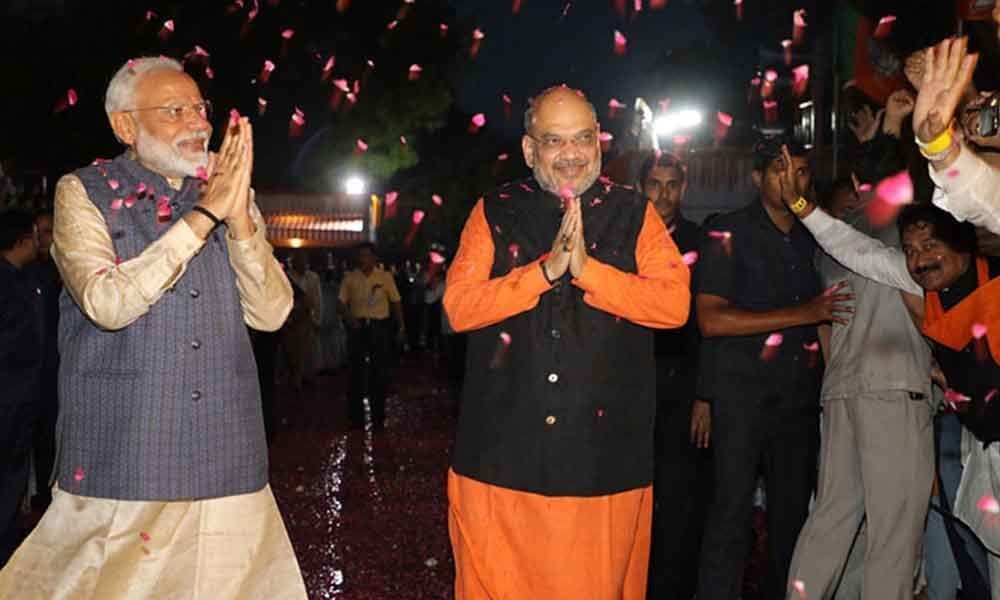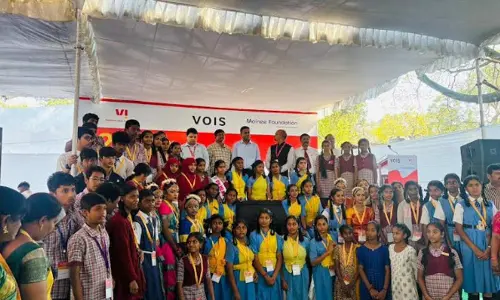Triumph of BJP's Hindu nationalist card

An electoral face-off between a religious/nationalist party and a gaggle of vaguely Left-Liberal outfits is almost always an unequal contest as the scales are invariably tilted in favour of the former.
An electoral face-off between a religious/nationalist party and a gaggle of vaguely Left-Liberal outfits is almost always an unequal contest as the scales are invariably tilted in favour of the former.
For the "bleeding heart" liberals, which is how they are mocked by their opponents, it is extremely difficult to counter the emotive appeal of faith and love for the motherland espoused by the right-wing.
There is little doubt that a major factor behind the victory of the Bharatiya Janata Party (BJP) in this year's general election is its championing of the nationalist cause with a touch of jingoism, especially in the aftermath of the Pulwama massacre and the subsequent air strikes in Balakot.
Prior to that, the BJP was generally perceived to be unable to make much of a headway in the electoral battle, which is why the Rashtriya Swayamsevak Sangh (RSS) insisted on immediately starting the construction of the Ram temple, evidently to raise the electoral tempo.
There is also a hidden subtext behind the BJP's portrayal of Pakistan as the mortal enemy, relating to the loyalty of the Indian Muslims.
Confronted with a challenge which links external threats with internal enemies, the BJP's opponents had little chance. It was a battle which the Congress and the other "secular" parties could not but lose.
If the BJP faced resistance in the outer peripheries of the country like Tamil Nadu, Odisha and Kerala, a possible reason was that the pro-Hindu pitch had little traction there, especially in Tamil Nadu with its atheist tradition represented by the Dravidian parties, and in Kerala with its Leftist background, which remained impervious to the BJP's religious ploys on the Sabarimala issue relating to the entry of women into the temple.
In Odisha and Punjab, the BJP came up against "strong" local leaders like Chief Ministers Naveen Patnaik and Amrinder Singh.
Besides, the party's Hindu card was less effective in Odisha, although the BJP did succeed in replacing a steadily weakening Congress as the State's main Opposition party.
It was the same story in West Bengal where another "strong" leader, Chief Minister Mamata Banerjee, partly succumbed to the BJP's Hindu card because of her own follies relating to the perception of being pro-Muslim and a failure to revive the State's industries.
It goes without saying that there is very little in the political kitty of the Congress and other non-BJP parties which can present a convincing alternative narrative at the moment.
Even relatively minor suggestions in the Congress manifesto like diluting the Armed Forces (Special Powers) Act and dispensing with the colonial-era sedition laws are liable to be seized upon by the Hindu Right as evidence of the role which the Left-Liberals can play in weakening the security forces and allowing the traitorous elements - the so-called 'tukde tukde' gang - to flourish.
It is noteworthy that Home Minister Rajnath Singh had not only pooh-poohed the idea of doing away with the sedition laws, but pledged to strengthen them even further, presumably making them more stringent than what the British thought was necessary.
While the BJP may firm up the mix of religion, patriotism and national security with more draconian laws, the Congress's espousal of the "idea of India" or a multicultural nation can appear as a watery concept which dilutes India's Hindu identity.
True, the Congress's pursuit of secularism was marred by missteps like negating the Supreme Court's judgment in the mid-1980s in favour of a divorced Muslim woman, thereby substantiating the BJP's argument that secularism to the Congress was tantamount to appeasing the Muslims.
The success of the BJP's propaganda in this respect has persuaded the Congress leaders to take to visiting temples and holding massive yagnas, as by Digvijay Singh in Bhopal which could not save him from defeat at the hands of the BJP's Sadhvi Pragya Thakur. An imitation does not have the same value as the genuine article.
It is this kind of a see-saw from Muslim "appeasement" to parroting the BJP's Hindu rituals which has made the Congress appear to be at sixes and sevens where its ideology is concerned.
Nor is there anyone in the party with the intellectual wherewithal to clarify that secularism does not mean favouring any community at the expense of the others, but to treat all equally and fairly.
In addition to this confusion about what is supposed to be the party's basic ideology, the Congress is plagued by its customary weakness - infighting which has been very much in evidence even at a time when the party is seemingly facing a major crisis.
If the Congress is unable to formulate a coherent ideology, other non-BJP parties remain mired in caste and localism without any pan-Indian vision.
The BJP scores on all these points - a strident pro-Hindu ideology which promises to cement India's place as a major power.
Even if the BJP's macro-economic outlook is unclear at present, unlike in 2014, it nevertheless expects to ride high with its nationalist agenda, aided and abetted by a weak opposition.
(The writer is a political analyst. The views expressed are personal)










